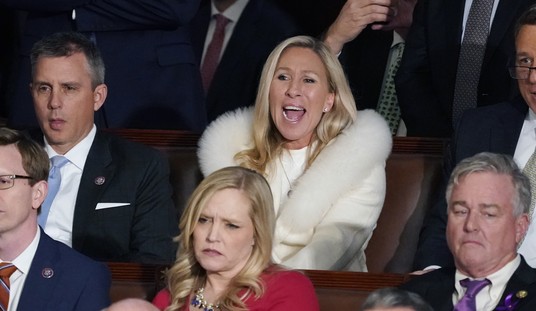The Conservative Treehouse described how Donald Trump likes to play the “leverage” or balance of power game in business and in politics. He structures a conflict such that he can tip the balance which gives him leverage he would otherwise lack, in this case by courting Jack Ma of Alibaba.
Against the backdrop of a known position by President-elect Trump toward the business and financial monopolization by Amazon and Jeff Bezos, President Trump publicly brings Alibaba CEO Jack Ma to the cameras in Trump Tower. All except the business media will probably skip over the larger play within this epic display of 3-D leverage creation. …
Trump is fracturing business globalism. Remember, all large business leaders in modern China are essentially political emissaries. China has been building an economic army for decades.
That is his modus operandi. If Trump needs leverage against both Amazon and China he tries to drive a wedge. It is an ancient art which the British at their height had mastered. “In the 16th and 17th centuries, English foreign policy strove to prevent a creation of a single universal monarchy in Europe, which many believed France or Spain might attempt to create. To maintain the balance of power, the English made alliances with other states—including Portugal, the Ottoman Empire, and the Netherlands—to counter the perceived threat.”
This game requires two skills: first creating divisions by encouraging competition among natural rivals; then building coalitions around the preferred solution to come out ahead. It’s an enormously powerful technique. Unrestrained it can degenerate into a cynical pursuit of gain and would be highly destabilizing were it not anchored in something more solid. Traditionally that anchor was provided by nationalism. The concept of a side — a nation, people or country — constrained the scope of coalition building to the benefit of a side.
In the past nations were presumed to have interests. Even America, Henry Kissinger quaintly observed “has no permanent friends or enemies, only interests”. In that model the American public “sat on the board” through their representatives and hired and fired key executives at election time.
But over time the intellectual allegiance of Western politicians shifted to the “international community”. No longer were they expected to pursue national interests but maximize the welfare of the global economy and international government. We the People became We Are the World. That may be about to change if Justin Vaïsse a former Senior Fellow at the Brookings Institution is right about Donald Trump’s determination to play the national interest game once again.
[Trump] has a special talent for evaluating power relations, finding the vulnerabilities of his opponents, getting support from other actors, and the like. We do not know if these skills transpose well into international politics, but they just might. If that is the case, then this scenario four would unfold not because there is a Kissinger or a Brzezinski at the White House but because the president instinctively makes decisions that maximize America’s direct interests — even during a crisis.
Now, there are two major objections to the idea that this scenario could succeed. The first one is obvious: International politics is not the world of real estate. Sometimes there is no good deal to be obtained, but only a menu of bad options to choose from with no possibility to abstain even when you want a lesser role for America. Worse, miscalculations or the misreading of other actors can result in being forced to choose between backing down or escalating. In other words, failed negotiations can mean humiliation or war.
The second objection is the more troubling one. If President Trump successfully pursues a policy along the lines of scenario four, this will have international system wide implications, to the point that after a few years, America will find itself operating in a very different, and potentially much more hostile, environment. Competitors might refuse the deals offered by the White House and raise the ante. They might also align more closely together, if only to get a better deal from Washington. Allies might consider that their security is no longer guaranteed by the United States, and they might either hedge their bets (isn’t it what President Duterte of the Philippines has been doing?). Or they might build up their own defenses, resulting in a more dangerous world of arms racing in which the issue of nuclear proliferation will acquire a new urgency. Other actors around the world might consider that new rules or no rules prevail and let their long-standing grievances or even their territorial appetites prevail at the expense of weaker players. The fight against terrorism, the top priority for Trump, might be hindered by frustrated players who will refuse to play along because they no longer see America as being on their side. These developments would only increase nationalism everywhere.
In trying to maximize American national interest Trump will inevitably sound the retreat for “internationalism”, not completely but partially. There may be no choice if threats are to be walled out. Ironically no one is now more afraid of interlopers than the Democratic Party whose excuse for losing the 2016 election is one word: Russia. CNN reports that US intelligence chiefs believe the Kremlin gathered opposition research on both Trump and Clinton but failed to even-handedly smear both.
These senior intelligence officials also included the synopsis to demonstrate that Russia had compiled information potentially harmful to both political parties, but only released information damaging to Hillary Clinton and Democrats. …
Sources tell CNN that these same allegations about communications between the Trump campaign and the Russians, mentioned in classified briefings for congressional leaders last year, prompted then-Senate Democratic Leader Harry Reid to send a letter to FBI Director Comey in October, in which he wrote, “It has become clear that you possess explosive information about close ties and coordination between Donald Trump, his top advisors, and the Russian government — a foreign interest openly hostile to the United States.”
Clearly the liberals are disappointed that Putin took sides. But at least he had side because he was playing to win, not for the Global World Order but for Russia or at all events for himself. If there’s a sense that the Kremlin should have stayed out, that some things should be reserved to Americans only then Kremlin hacking should no more be permissible than Mexicans voting in US elections.
Yet in a city as full of glass houses as Washington who can afford to throw stones? Can Obama with his record of dealing with Iran? Can Hillary, she of the eponymous foundation? Can Podesta who when not helping Hillary represents the Russian and Saudi governments as a lobbyist? Washington is crawling with foreign agents and citizens of the world. How is anyone to judge who is openly “hostile to the United States”?
What about the voters? Can they judge?
The problem is they have. In retrospect liberalism’s key blunder was to fire the board by declaring them the Deplorables. Hillary, like certain Hollywood actors, was quite prepared to do without them. The Obama administration exemplified this tendency basing its foreign policy on actions passed within the United Nations, using the Security Council to fundamentally alter relations with Iran and Israel and not by Senate ratified treaty.
After 8 years of phone and a pen and hyphenated citizenry the liberal project finds they need the Deplorables after all. The Stars and Stripes provided the most important function of all in a dealmaking world: it provided a point of view without which “winning” and “losing” is meaningless. For decades the liberal world acted as if they lived in an eternal context; like they had a mandate from history itself to impose concepts like Green Energy or a borderless world which were assumed to be irreversible, inevitable, imbued with a life of their own. But a borderless world also brought the Russians and the Saudis to Washington. Suddenly the danger long ignored is now manifest. Now the liberals too find themselves claiming the protection of that anachronism, that “America which has no permanent friends or enemies, only interests”. Because they too have interests, because they too in the last analysis are Americans.
As Barack Obama gives his farewell speech in Chicago and Donald Trump gets ready to assume office, it may be useful to reflect on the oath the incoming president will take. “I do solemnly swear (or affirm) that I will faithfully execute the Office of President of the United States, and will to the best of my ability, preserve, protect and defend the Constitution of the United States.”
It is an oath not to an Arc of History, the Planet or some progressive vision of the future. It’s not an oath to Mexico or Europe or the Liberal world order. The text of the oath is a declaration of allegiance to permanent interests of the United States and the people who live in it, as determined by the Constitution and the laws of the land — or it is nothing.
Perhaps Obama did at times forget this, to his cost. But Trump must never be allowed to. Now about those lobbies …
Follow Wretchard on Twitter
For a list of books most frequently purchased by readers visit my homepage.
Support the Belmont Club by purchasing from Amazon through the links below.
Books:
Code Warriors: NSA’s Codebreakers and the Secret Intelligence War Against the Soviet Union, Author Stephen Budiansky – a longtime expert in cryptology – tells the fascinating story of how the NSA came to be, from its roots in World War II through the fall of the Berlin Wall. With access to new documents, Budiansky shows where the agency succeeded and failed during the Cold War and a series of appendixes explain the technical details of Soviet codes and how they were broken. An essential and timely read for all who seek to understand the origins of the modern NSA.
The Admirals: Nimitz, Halsey, Leahy, and King – The Five-Star Admirals Who Won the War at Sea, by Walter Borneman. Drawing upon journals, ship logs, and other primary sources, Borneman shows how history’s only five-star admirals triumphed in World War II, revolutionized naval power forever, and made the United States the world’s dominant sea power.
Relativity: The Special and General Theory, by Albert Einstein. Written by Einstein for those who are interested in the theory but are not especially well-versed in higher mathematical concepts and theoretical physics.
The Final Day: A Novel (A John Matherson Novel), by William R. Forstchen. The third book in the “One Second After” series when an electromagnetic pulse wipes out all electricity and plunges the entire United States into darkness, starvation, and death.
The Great Good Thing: A Secular Jew Comes to Faith in Christ, Bestselling novelist Andrew Klavan tells of his improbable conversion, at age fifty, from agnostic Jewish intellectual to baptized Christian and of the books, stories and events that led him there.
Did you know that you can purchase some of these books and pamphlets by Richard Fernandez and share them with your friends? They will receive a link in their email and it will automatically give them access to a Kindle reader on their smartphone, computer or even as a web-readable document.
The War of the Words, Understanding the crisis of the early 21st century in terms of information corruption in the financial, security and political spheres
Rebranding Christianity, or why the truth shall make you free
The Three Conjectures, reflections on terrorism and the nuclear age
Storming the Castle, why government should get small
No Way In at Amazon Kindle. Fiction. A flight into peril, flashbacks to underground action.
Storm Over the South China Sea, how China is restarting history in the Pacific
Tip Jar or Subscribe or Unsubscribe to the Belmont Club










Join the conversation as a VIP Member